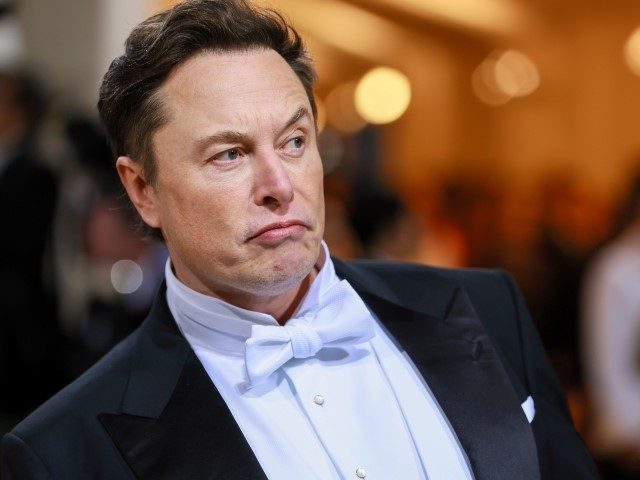AREN'T WE ALL SICK OF SEEING MUSK'S FACE ALL OVER THE PLANET?
In a series of Tweets, Taibbi stated: “Supposed free speech champion @ElonMusk has decided to suppress this account forever, instead of just talking to me. @ElonMusk is uncomfortable around people who aren’t afraid of him, and wants to prove he can hurt my business instead of just talking to me, even if it means suppressing access to news he thinks is important.”
Read more at Mediaite here.
‘You Are Dead to Me:’ Elon Musk Rages at ‘Twitter Files’ Journo Matt Taibbi in Leaked Messages

Elon Musk’s turbulent relationship with journalist Matt Taibbi reached a breaking point this week, as leaked direct messages revealed the billionaire’s volatile temper and threats to his former “Twitter Files” ally.
Mediaite reports that journalist Matt Taibbi has published a series of unhinged direct messages from billionaire Tesla CEO and X/Twitter owner Elon Musk. The posts shed light on Musk’s mounting frustration over his former ally’s coverage on Substack. Taibbi, who collaborated with Musk on the “Twitter Files,” publicly posted screenshots of private conversations on Thursday with messages dating back to January 2023, revealing the deteriorating relationship between the two over the past year.
At the heart of Musk’s ire for Taibbi is the journalist’s use of Substack for posting his articles. Musk started a war with Substack in 2023.
In one exchange Taibbi asks if his posts are being “shadowbanned” on Twitter, to which Musk responds: “We went on lockdown after discovering that Substack had stolen a massive amount of our data to prepopulate their Twitter rip-off. Looks like there is still a blanket search ban. Should be fixed by tomorrow.”
In another exchange, Taibbi asks: “Elon, I’ve repeatedly declined to criticize you and have nothing to do with your beef with Substack. Is there a reason why I’m being put in the middle of things? This really seems crazy,” to which Musk replied: “You are dead to me. Please get off Twitter and just stay on Substack.”
The posts highlight Musk’s short fuse when it comes to any perceived criticism, even from a longtime supporter like Taibbi. Once hailed as a “free speech absolutist,” Musk has grown increasingly intolerant of dissenting voices on the platform he paid $44 billion to acquire. Taibbi initially emerged as a vocal advocate of Musk’s vision for a less-regulated X/Twitter, but he adopted a more critical tone in recent Substack articles, blasting Musk’s “chaotic” management style and “tone-deaf” policy changes.
In a series of Tweets, Taibbi stated: “Supposed free speech champion @ElonMusk has decided to suppress this account forever, instead of just talking to me. @ElonMusk is uncomfortable around people who aren’t afraid of him, and wants to prove he can hurt my business instead of just talking to me, even if it means suppressing access to news he thinks is important.”
Read more at Mediaite here.
Lucas Nolan is a reporter for Breitbart News covering issues of free speech and online censorship.
Has Our Government Erased the First Amendment?
The most important thing you will see this week is this interview of Mike Benz by Tucker Carlson: Benz is with the Foundation for Freedom, which tracks government censorship. In this interview he explains how our government rigged elections abroad and has now, through DHS (Department of Homeland Security) and CISA (Cybersecurity and Infrastructure Security Agency), censored online communications, noting that its most substantial censorship involved blocking and limiting any critiques online respecting the government’s responses to COVID-19 and the security of the 2020 election.
It's a well-detailed account that I urge you in the strongest terms to view.
In short form, here’s a summary, but it cannot do this chilling interview complete justice:
THREAD:
speaks with
Mike Benz outlines how the government established a permanent domestic censorship office under the pretext of countering misinformation. and disinformation. Initially considered for the State Department, CIA, and FBI, the censorship office found its home in the Department of Homeland Security (DHS), utilizing the Cybersecurity and Infrastructure Security Agency (CISA). DHS classified elections as critical infrastructure and online misinformation, disinformation, and malinformation as cybersecurity attacks. The original goal of countering Russian disinformation shifted to suppressing domestic dissent and the populist movement led by President Trump. Examining the 2020 election's censorship strategy, Benz details CISA's collaboration with Stanford University, University of Washington, Graphika, and the Atlantic Council through the Election Integrity Partnership. The censorship consortium employed coercive tactics, leveraging its deputized status to pressure tech companies through government threats. A critical element was the seven-month pre-censorship campaign before the 2020 election. The consortium compelled social media companies to introduce a new "delegitimization" violation, targeting content challenging faith in mail-in ballots, early voting, and ballot drop boxes. The overarching goal was narrative control, preventing doubts about a Biden victory and avoiding a crisis akin to the 2000 Bush-Gore election. Anticipating Biden's victory hinging on mail-in ballots, early voting, and ballot dropboxes, the consortium precensored any questioning of the election's legitimacy, particularly if Trump appeared to win on election night but later lost due to late-arriving mail-in ballots. The so-called "Red Mirage-Blue Shift event."
The DHS outsourced censorship to the Election Integrity Partnership (EIP), comprised of four organizations: Stanford Internet Observatory, the University of Washington’s Center for an Informed Public, Atlantic Council’s Digital Forensic Research Lab, and Graphika. During the 2020 election: •120 analysts monitored 15 tech platforms •22 Million tweets labeled “misinformation” •Entire “misinformation narratives” targeted for platform-wide throttling The EIP claimed every "repeat spreader of election misinformation" was a supporter of President Trump.
Benz explains that in about 2016 the government could no longer count on its backdoor to the legacy media -- favor for favor and access -- to control communications across a broad spectrum, something that had served it well as a censorship tool for decades.
 The internet had far wider reach and allowed independent voices to outcompete the legacy media, which had been the government’s reliable megaphones. The growth of huge social media platforms disrupted the government’s usual speech-control techniques and it scrambled to find new ways to control what we learned as legacy media was shrinking in reach and respect. Using the fraudulent Russiagate as a justification for their conduct, they were forced to seek new, less plausible justifications when the Mueller investigation established that pretext would be unavailing.
The internet had far wider reach and allowed independent voices to outcompete the legacy media, which had been the government’s reliable megaphones. The growth of huge social media platforms disrupted the government’s usual speech-control techniques and it scrambled to find new ways to control what we learned as legacy media was shrinking in reach and respect. Using the fraudulent Russiagate as a justification for their conduct, they were forced to seek new, less plausible justifications when the Mueller investigation established that pretext would be unavailing.
The extent of the government's meddling was revealed when Elon Musk took over and released internal files revealing much of the government censorship of what was then Twitter. The election of a Republican House willing to examine this overreach also exposed the scheme. While the government relies in large part on technology Musk has developed so it has less leverage over him than it has on other platforms, through a combination of lawsuits against him and the aid of the EU it enlisted to fine noncompliance with its censorship it still is trying to restrict free speech on X, presently the largest free speech platform in the world.
There are several cases now pending in the Supreme Court questioning whether the government can censor internet communications through proxies what it cannot do directly.
The most significant is Murthy v. Missouri. In July 2023 the District Court issued a preliminary injunction against the Department of Justice, Department of Health and Human Services, State Department, Centers for Disease Control and Prevention, and the FBI from contacting social media services in order to urge, encourage, pressure or induce the “removal, deletion, suppression, or reduction of content containing protected free speech.” These same agencies were enjoined from communicating with three academic programs at Stanford University and the University of Washington which were engaged in censorship activities on behalf of the federal government which funded them. On appeal the Fifth Circuit upheld the district court ruling, but placed the injunction on hold pending Supreme Court action. (Subsequently, the Fifth Circuit expanded the injunction to include CISA. finding that agency interacted with social media platforms “to push them to adopt more restrictive policies on election-related speech.”) With Justices Alito, Thomas, and Gorsuch dissenting, the Court lifted the injunction while the case proceeds. Alito wrote, ”Government censorship of private speech is antithetical to our democratic form of government, and therefore today’s decision is highly disturbing.”
Murthy is not the only government censorship case pending decision in the Supreme Court. There’s NRA v. Vullo questioning whether the threats by New York’s Department of Financial Services against regulated banks and insurance companied to sever ties with the NRA violates the First Amendment.
And there are two companion cases, Net Choice v Paxton and Moody v Net Choice, involving formal legislation regulating social media content.
Two other free speech cases are pending in the Supreme Court -- Lindke v. Freed and O’Connor-Ratcliff v. Garnier, both of which concern when and whether a government official’s use of a social media platform becomes state action.
New technologies offer promise and challenges to the Deep State. Benz has made a persuasive historically accurate case demonstrating how techniques developed by government agencies to meddle with elections abroad have now metastasized online to interfere with domestic elections and policies. He has also persuasively shown how these agencies fear popular control, justifying their actions by confusing the concept of “democracy” with the preservation of existing institutions like NATO and the IMF. And, of course, their own power to continue to control public perceptions of government policies and elections.

No comments:
Post a Comment